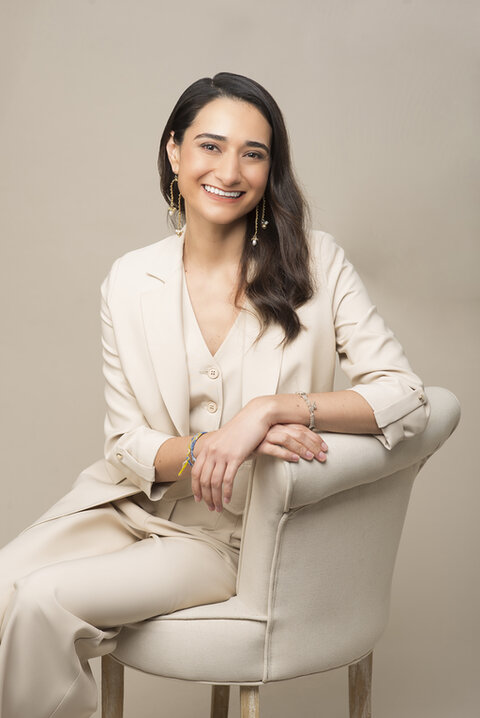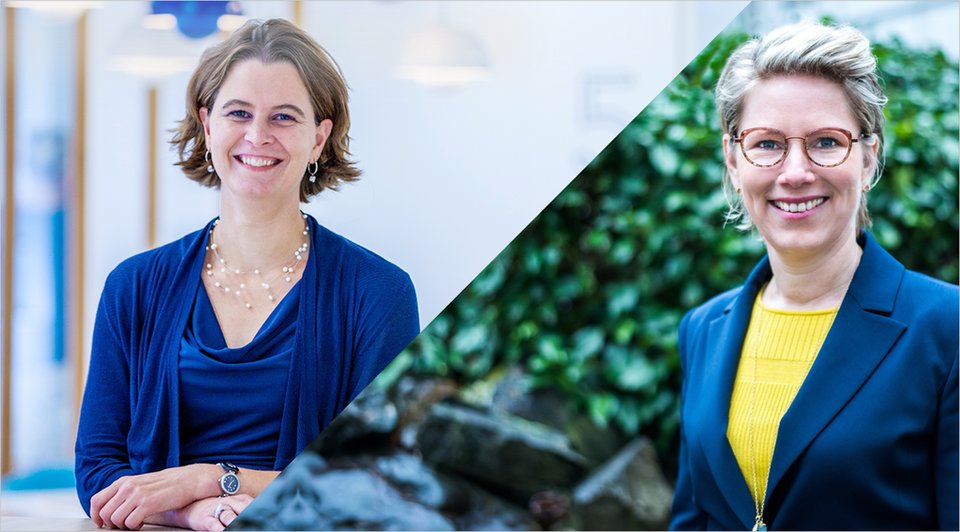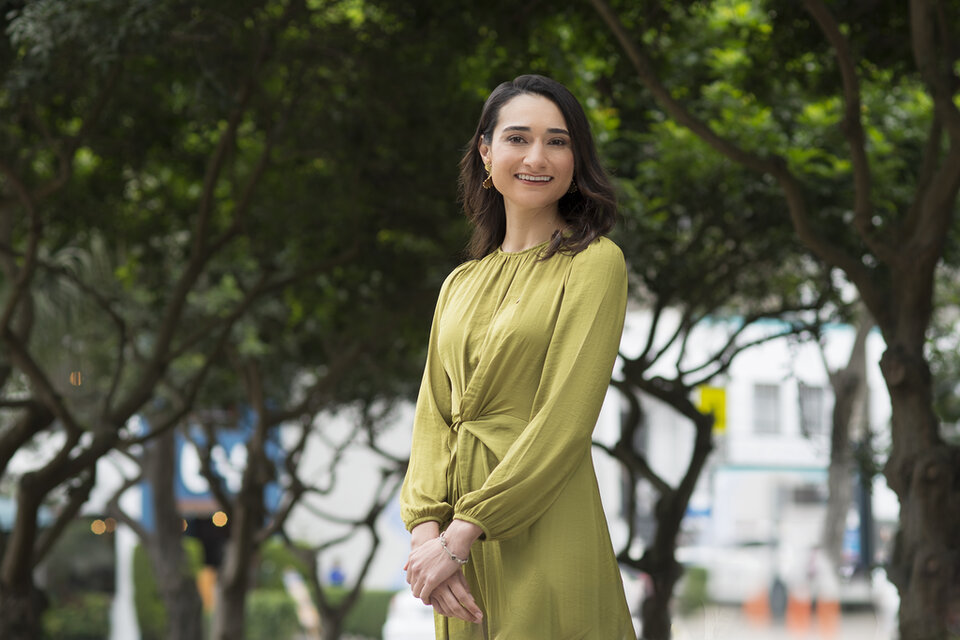Patient’s Perspective
04
Diversity, Equity
and Action
Carmen Monge-Montero is a global cancer advocate, researcher, storyteller, and cancer survivor from Costa Rica who has lived in eight different countries over the past twelve years. At just 24, she was diagnosed with Hodgkin lymphoma – an experience that reshaped her worldview and led her to explore life across continents. Her unique perspective as a migrant and cancer survivor now fuels her advocacy for equity, diversity, and inclusion in cancer care. Today, she collaborates with Youth Cancer Europe alongside other patient advocacy organizations, leads the storytelling platform MANO Beyond Cancer, and is a published children’s book author.

As we have highlighted in previous editions of our digital magazine, the patient perspective is of vital importance to Oncode Accelerator. While our work focuses on the early stages of cancer drug development — which often feels far removed from the clinic — it is critical to stay grounded in the lived experiences of those we aim to serve. Amplifying patient voices reminds us of the complexity and diversity of the people living with and beyond cancer.

The Great Diversity of Cancer Patients
The diversity of cancer patients is an important consideration for both drug development and cancer care. This diversity can pose a challenge to drug development — it’s very difficult to develop drugs that are broadly effective across diverse patient populations — but also offers opportunities for better, more inclusive care. To explore this further, we spoke with Carmen Monge-Montero, whose advocacy centers young people living with and beyond cancer, with a special focus on underrepresented communities.
Since her own diagnosis with and treatment for Hodgkin lymphoma at age 24, Carmen has lived in eight different countries, changed career paths from chemistry food science to advocacy, and dedicated her work to amplifying the voices of adolescents and young adults (AYA) who have faced cancer – with a particular focus on diversity, equity, and inclusion.
“My diagnosis changed not only my health, but my entire life path,” she explains. “After treatment, everybody says that you go back to your normal life – but what is normal? Especially when you are young, it’s difficult to talk about life after cancer with friends your age.”

Carmen Monge-Montero, Cancer advocate, researcher and storyteller
After treatment, everybody says that you go back to your normal life – but what is normal? Especially when you are young, it’s difficult to talk about life after cancer with friends your age.
By Katell Maguet, Patient Advocate
Carmen Monge-Montero, Cancer advocate, researcher and storyteller
Using her unique experience and research skills, Carmen has contributed in major projects such as the development of Youth Cancer Europe’s recommendations on equitable, diverse, and inclusive cancer care as part of the European Commission co-funded EU-CAYAS-NET project, which was presented to the European Parliament in 2024. She is now working in the new European Youth Cancer Network (YARN). YARN is the largest multi-stakeholder, lived experience-driven effort of its kind in Europe, and aims to improve quality of life for children, adolescents, and young adults affected by cancer. Within YARN, Carmen will contribute to the Equity, Diversity and Inclusion work package, which will focus on developing tools and resources to enhance inclusivity across healthcare settings, patient organizations, and communication campaigns.
“Anyone can have cancer – whether pediatric, adolescent, young adult, or older. But younger populations have different types of cancer, and sometimes there are not many studies done on cancers in young populations. That is why it’s so important to support people from underrepresented and underserved communities.”
Unique Challenges for Young Adults Living with and Beyond Cancer
As well as emphasizing the value of research that focuses on the types of cancers affecting young populations, Carmen also explained that adolescents and young adults may face unique physical, emotional, and socioeconomic side effects compared to older adults or pediatric patients.
“On my YouTube channel MANO Beyond Cancer, I’ve interviewed more than 70 cancer survivors living in over 40 different countries. Across those videos, you can see that there’s a big difference in experiences. For instance, some pediatric cancer survivors do not remember the experience since they were very young, and if they do remember, their perception is different from adolescents and young adults with a lived cancer experience. They began their lives in good health and then suddenly got sick. It is a shock when you’re starting to build a life – beginning studies or starting to work – and then having to stop everything for a disease that can impact you for rest of your life.”
AYA survivors also often face unique stigma and societal challenges. “In many countries there is still taboo and discrimination. After treatment, young cancer survivors have so much ahead of them, and might be thinking about buying a house, building a career, starting a family… But we sometimes face barriers and stigmas that makes it difficult to rebuild our lives.”
Anyone can have cancer – whether pediatric, adolescent, young adult, or older. But younger populations have different types of cancer, and sometimes there are not many studies done on cancers in young populations. That is why it’s so important to support people from underrepresented and underserved communities.
By Katell Maguet, Patient Advocate
Carmen Monge-Montero, Cancer advocate, researcher and storyteller
Storytelling as a Tool for Change
Removing this stigma is a major focus of Carmen’s work and was a driving factor behind the launch of MANO Beyond Cancer. “I wanted to showcase the person, not the illness, and highlight their unique experiences and perspectives rather than just their treatments.”
“In talking with cancer survivors from all over the world, I realized that in one way or another, cancer is a taboo topic everywhere. People don’t talk about it openly or in a holistic way. I wanted to remove cancer stigma, and I realized that to do that we have to start from a young age. I wanted to teach kids that cancer can happen to anyone, but cancer is not equal to death. Cancer is a lot more than that. For me, cancer is life – it puts you in a position where you start thinking more about your life.”
This insight led to Carmen’s first book, Can-Can and the Adventure of Mìng Island, which introduces young readers to cancer in a thoughtful, inclusive way, while also addressing the emotional and social aspects of a cancer diagnosis. Can-Can is the first of a trilogy, with future books focusing on other stages of the cancer journey: treatment, and life after cancer.
Integrating Patient Diversity into Drug Development
Carmen’s work reminds us that patient diversity must be a foundation —not an afterthought — in cancer research and care. At Oncode Accelerator, we contribute to this by developing innovations to bring patient-centered approaches into the earliest stages of drug development.
Currently, it remains difficult in early-stage cancer research to take the diversity of patients into account. This is one reason why many drugs in clinical trials are not as effective as expected, and why new cancer therapies are often only effective in a subset of the intended patient population. To try to bring patient diversity into the lab, we are integrating three innovation platforms — well-defined Patient Cohorts, Organoids, and Artificial Intelligence — into early drug development pipelines.
By using real-world and real-time data from our Patient Cohorts Platform, developing representative laboratory models within our Organoids Platform, and applying predictive models created within our Artificial Intelligence Platform, we aim to help scientists discover and develop more effective treatments – and identify the patients most likely to benefit from them.
By embedding a consideration of patient diversity within our frameworks for drug development and innovation, we aim to build a better future for cancer care – for cancer patients of all ages.
About
Carmen Monge-Montero
Cancer advocate, researcher and storyteller
Carmen Monge-Montero is a global cancer advocate, researcher, and storyteller committed to equity, inclusion, and dignity for people affected by cancer. Drawing from both personal experience and academic training, she works to challenge stigma, promote survivor voices, and influence systemic change. Currently, she serves as a researcher at Youth Cancer Europe, focusing on Equity, Diversity, and Inclusion in cancer care. Carmen is also the founder of MANO Beyond Cancer, a storytelling platform that connects cancer survivors across continents, and the author of Can-Can books, a children’s series created to support families navigating cancer through hope and empathy. With a background in behavioral research and data analysis, Carmen combines evidence-based insights with advocacy, and has presented her work at international conferences, public forums, and motivational events around the world.
About
Miriam Koopman
Miriam is internist-oncologist and professor of medical oncology at University Medical Center Utrecht, and acts as Principal Investigator and Scientific Lead of the Well-defined Patient Cohorts platform within Oncode Accelerator.